- HOME
- Alumni News
- Activity Reports
- Jamna’s Activity Report
Activity Reports
Jamna’s Activity Report
CIL KATHMANDU
Independent Living Center for Persons with Disabilities, Kathmandu
Progress Report: Month Of February 2019
Introduction of organization
CIL-Kathmandu is a completely non-profitable and non-political, self-help organization run by and for persons with disabilities. It is a non-governmental organization established to work for the promotion and protection of the rights of persons with disabilities (PWDs) through the concept of independent living. The term "Independent Living" as defined by people with disabilities does not mean doing things for you or living on your own. It means having choice and control over the assistance and or equipment/assistive devices needed for daily life and having access to amenities that society has to offer such as housing, transport, health services, employment, as well as entertainment, education and training opportunities. Independent Living (IL) is a vision, a philosophy and a movement of persons with disabilities to promote and protect the human right of PWDs.
Independent Living Center, Kathmandu (CIL-Kathmandu) is working to promote and establish the concept of independent living in Nepal with the support of Ministry of Women Children and Social Welfare, Iruka NPO Center for Independent Living, Okinawa, JICA-Okinawa and Australian Volunteers Program, Planete Urgence and Kathmandu Metropolitan City Office, Attiva-Mente, Associazione Spotiva Culturale Disabilli (AMASCD-Republic of San Marino) and Government of Nepal.
The month of February was particularly busy with the developing proposals, Memorandum of Understanding for wheelchair manufacturing and Independent Living initiative and training for young PWDs on Civil Service Commissions Exam preparations. Additionally, CILKathmandu also focused on building the relationship with different national and international disability rights activists.
The activities that were carried out during February 2019 are as follows:
1. Advocacy at Kathmandu Metropolitan City Office:
CIL-Kathmandu team visited at Kathmandu Metropolitan City Office, Bagdarbar and met Ms Hari Prabha Khadki, Deputy Mayor on 1st February and 7th February 2019. CIL-Kathmandu team highlighted the infrastructural barriers that persons with disabilities are facing in major public spaces constructed and maintained by Kathmandu Metropolitan City Office. CILKathmandu was notified about the upcoming construction of public toilets in major areas of Kathmandu city. CIL-Kathmandu team asked to ensure the design met universally accepted standards so that every individual, despite of disability, age, sexuality etc., may have exercise their rights to use and access the public restrooms. Ms. Khadki shared her concern about the design of the public toilets and she committed to convey this request to her team and the construction committee so that Kathmandu public toilets will meet the international standard of accessibility.
Similarly, CIL-Kathmandu carried advocacy to update support system of metropolitan city office and ward offices for ensuring rights of persons living with severe and profound disability. The office shared about the undergoing data collection process and which will be finalized soon. CIL-Kathmandu also requested to form ‘Local Coordination Committee” according to Disability Rights Act 2016 Article 42. The office highly supports the formation of such a committee and coordinating with different stakeholders and DPOs actively working in Kathmandu.
Additionally, CIL-Kathmandu team advocated to increase budget that the office carries for supporting disabled rights activist led organizations in Kathmandu. The office informed about allocated budget for fiscal year 2018/19 for daily living allowances, assistive device, health, education and empowerment of individuals living with disabilities. Further, they have advised CIL-Kathmandu to come up with concrete idea of resolving current needs of youth living with disabilities. CIL-Kathmandu is working hard on empowering youth living with severe ‘B’ class disability by providing a week training course for individuals who have completed their senior high school and are looking to apply for civil service. In Nepal, due to infrastructural barriersindividuals using a wheelchair for mobility finds it difficult to attend classes offered by different private and public enterprises for preparing for exams of civil service.
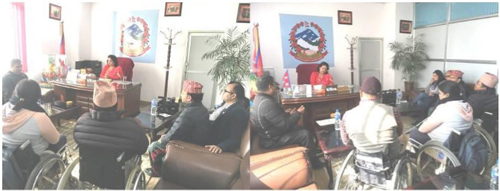
Picture 1: CIL-Kathmandu Team at office of Deputy Mayer of Kathmandu Metropolitan City.
2. Independent Living Program:
CIL-Kathmandu, partnering with Ministry of Women Children and Senior Citizen, conducted 5 days of independent living skill development activities to Mr. Sudip Saud running from 10th February to 15th February 2019.
Mr. Saud, 32 years old from Tikapur, Kailali has lived with a spinal cord injury disability since 2006. He suffered from a brain stroke in 2005, and due to the brain stroke he needs to change valve of his heart. Because of his stroke he was unable to talk, and although only his left side of the body was not functioning well, he felt as if his whole body was. Later in 2006 he suffered from bone tuberculosis. He was lacking money to have the necessary surgery. However, he was able to take the prescribed medicine against tuberculosis, which after taking for 6 months, gradually helped him heal from the disease. He got a job at hydropower company and worked for 3 years as a technician for the company. He received a very small salary from the hydropower company so he left and went to India find a job. After a year working in India, Mr. Saud started to feel sick and some parts of his body were lacking sensation. He went to hospital for check up, doctor suggested to consult with his family members for further treatment; he resigned the job in India and came back Nepal.
A year after returning from India, one day he felt extreme cold and fever. He was taken to Nepalgunj Medical College, and underwent treatment. During the surgery of his spine bone unfortunately some spine nerves got cutoff and he woke up faced with a spinal cord injury level C8. Mr. Saud has some movement in his hand like grasp and release objects and can do most activities of daily living by himself, but he needs assistance with more difficult tasks. He can drive his wheelchairs but he has lost voluntary control of his bowl or bladder.
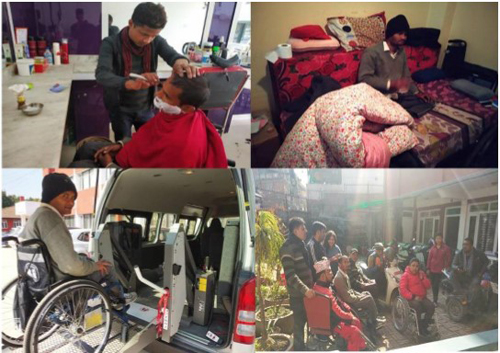
Picture 2: Mr. Saud is enjoying his time at CIL-Kathmandu.
Mr. Saud came to know about Spinal Injury Rehabilitation Center (SIRC) in Sanga. He was able to receive peer counseling, self care training and training on computer for 4 months. SIRC recommended Mr. Saud to visit CIL-Kathmandu for learning independent living skills. During his stay at CIL-Kathmandu office, he was able to utilize the personal attendant (PA) services provided by CIL-Kathmandu to learn more about the role of personal attendants for independent living and for self determination. He also visited a movie theater, went shopping and went sightseeing near to Baneshwor area. During his training, he learnt to cook, wash dishes and clothes and clean the room within a barrier free environment. Now he has returned to the Spinal Injury Rehabilitation Center in Sanga to receive further rehabilitation course from the center. Additionally, he is diagnosed with heart problems as well. Now, he is taking medicines for heart care as well.
3. Peer Counseling:
In February, CIL-Kathmandu conducted three individual peer counseling sessions, inviting each participant to the office in New Baneshwor. For Independent Living Movement, peer counseling plays vital role to find out the real needs, whether that is medical aid or psychological tools or anything in between, of individuals living with disabilities. A trained counselor assesses the psycho-social situation of client in order to develop appropriate solutions so that the client’s awareness about his/her own disability rises, acceptance of his/ her disability and to build confidence to cope or reduce barriers that he/she is facing in community.
CIL-Kathmandu believes that anyone, if he/she has the opportunity, can solve most of his or her own daily life problems. It is not the job of a peer counselor to solve someone else's problems, but simply to help the other person independently find appropriate solutions. Peer Counselors neither say what someone should "do" nor give prescribed advice. Instead, a peer counselor helps to find solutions by listening, reporting on his/his own personal experiences, exploring opportunities and resources with the person to be counseled to simply give her/ him support.
Mr. Sudip Saud, Ms. AnuTharu and Ms. Bhawana Upadhyaya were beneficiaries of the peer counseling service of CIL-Kathmandu during February.
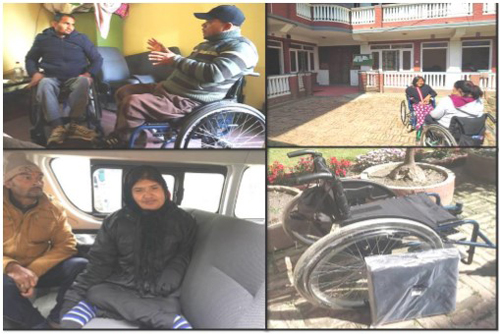
Picture 3: Mr. Saud, Ms. Anu and Ms. Bhawana enjoying counseling at CIL-Kathmandu
Mr. Tek Bahadur Gurung, Vice President of CIL-Kathmandu provided counseling to Mr. Sudip Saud during his independent living skill learning course starting from 10th February to 15th February 2019.
Ms. Devi Acharya, Treasurer of CIL-Kathmandu did preliminary peer counseling to Ms. Anu Tharu who lives with a spinal cord injury and is now taking a rehabilitation course at the Spinal Injury Rehabilitation Center, Sanga. Ms. Tharu is going to receive a week course of independent living from CIL-Kathmandu in next month.
Ms. Bhawana Upadhyayas a 19 year old woman living with physical disability due to polio infection in her childhood. She received peer counseling from Mr. Ganesh K.C, President of CIL-Kathmandu and additional peer counseling from Ms. Devi Acharya was provided on 16February 2019. During the course, the counselors identified the immediate need of an active wheelchair for her easy mobility. She was referred to National Rehabilitation Societyfor Disabled (NRSD). NRSD assessed and suggested her to wait for a month for a new wheelchair. CIL-Kathmandu has been doing necessary coordination and is confident on receiving appropriate manual wheelchair for Ms. Upadhyayanext month.
4. Accessible Van Support to make happy visit of Japanese Delegates:
CIL-Kathmandu was notified by Independent Living Center (ILC-Lalitpur) about five day long trip of six delegates from Mainstream Association in Japan starting from 13th February to 17th February 2019. CIL-Kathmandu was pleased to offer their accessible van for the duration of the visit. We believe that for the first time in Nepal, our delegate friends from Japan felt safe and dignified using this new accessible transport during their stay.
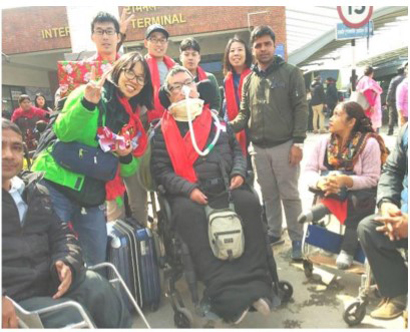
Picture 4: Mr. Ramesh Neupane (third from the right) Staff of CIL-Kathmandu with Japanese Delegates.
5. Strengthening of Relationship with Australia
CIL-Kathmandu was excited to welcome Ms. Rajuna Sing, an Australia Award recipient atits office to continue strengthen CIL-Kathmandu’s ongoing relationship with Australia. Ms. Sing went to Australia to learn more about the special education system of Australian Government. She has done her master degree on Special Education. CIL-Kathmandu team was very happy to hear about her experience in Australia and education system.
Mr. Ganesh K.C and Mr. Tek Bahadur Gurung from CIL-Kathmandu welcomed Ms. Sing and introduced CIL-Kathmandu’s mission, vision and goals and explained the leading position taken by the center on promoting the independent living movement in Nepal and the organizations contribution on overall disability movement of the Nepal. They also shared updates on the current situation of persons with disabilities in Nepal and CIL-Kathmandu’s history of partnering with Australia through the Australian Volunteers Program and the Australia Award Program.
From April 16-28 2018, Ms Jamuna Subedi, Secretary General of CIL-Kathmandu, travelled to Brisbane, Australia to undertake an intensive short course on Inclusive Education. Her attendance at the course was made possible through the Australia Awards scholarship program which provided an opportunity to learn about inclusive education system and its practices in Australia. The 16-day course was hosted by Queensland University of Technology (QUT), in Brisbane.
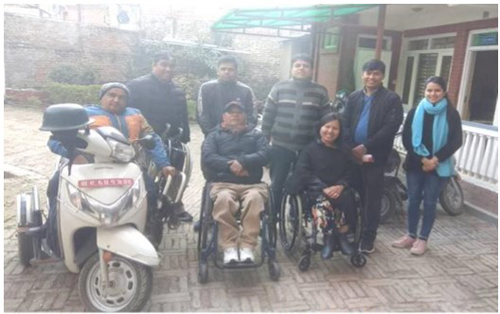
Picture 5: Ms. Rajuna and her husband visit at CIL-Kathmandu
The Australian Government has been collaborating with Nepal Government to enhance the capacity of non-government and non-profit organizations operating within the country. Through this partnership, CIL-Kathmandu has received four Australian volunteers since 2016. CIL-Kathmandu received the opportunity to utilize the volunteers’ expertise by participating in training for updating the website, Facebook, publishing E-bulletins and brochures as advocacy tools, developing a 5 years strategic plan, developing an annual plan and Structural Organization Profile.
Similarly, CIL-Kathmandu staff had the opportunity to improve their English skills, develop their report and proposal writing and advocacy and awareness about disability and challenges that persons with disabilities are facing.
Remembering all the intensive support received by Australian Government through these programs, CIL-Kathmandu is highly interested to collaborate with disabled peoples organizations in Australia for organizational development, networking and establishing a long term partnership for contributing disability rights movement in Nepal. CIL-Kathmandu is very happy to receive Ms Rajuna Sing at our office and meeting was concluded with supporting each other in needed areas for promoting inclusive education in Nepal as well.
6. Accessible Van Launch Published in Link Disability Magazine in Australia:
Last year CIL-Kathmandu proudly launched Nepal’s first ever fully wheelchair accessible van. The success story of the van and its launch, along with the wider activities of CIL-Kathmandu, was highlighted in an interview Australian volunteer Ms. Maddy Broadbridge conducted with an Australian disability magazine when she returned home from Nepal.
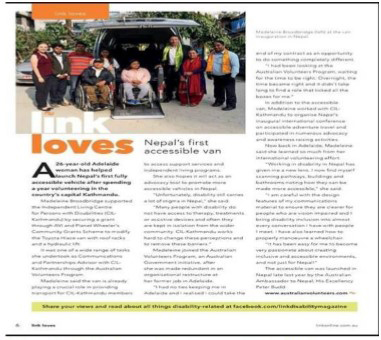
Picture 6: CIL-Kathmandu's News on Australian's National Cross Disability Magazine
Link Magazine is Australia's leading national cross-disability magazine. CIL Kathmandu family is very thankful for the support from AVI, Australia and Seoul Independent Living Center, South Korea for helping us to introduce the first accessible van in Nepal. And also extend thanks to Ms. Maddy for her wonderful efforts to make our dream come true and for sharing our center's story in Australia through Link Disability Magazine. The article can be read on Page 6:
https://linkonline.com.au/assets/attachments/blog/69/link-february-2019-web.pdf
7. Establishment of Networking and Partnership:
a. Partnership with Kathmandu metropolitan City office:
CIL-Kathmandu conducted several visits to the Kathmandu Metropolitan City office to build a partnership for conducting a week of preparation classes for people using wheelchairs who will undertake the upcoming civil service examination.
Everyone lives, attends school, shops, eats, works, and socializes within local communities. But, everyday wheelchair users encounter inaccessible and/or unaccommodating venues and therefore have no choice or options to enjoy our rights to mobility, equal participation and be active members of the community by adding our values for the community. Many wheelchair users travelling or moving outside have negative experiences because of peoples’ discriminative attitude towards disability and inaccessible basic public facilities.
After fifty years of the disability movement in Nepal (the establishment of Khagendra New life Center and National Disabled Association was in 1969), people living with disability still feel deeply isolated by our family, neighbours, community and state. As CIL-Kathmandu shared about this isolation to Ms. Hari Prabha Khadki, Deputy Mayor from Kathmandu Metropolitan City office, she realized the urgent need to work on providing a platform to upgrade skills and knowledge of attending civil service examination so that wheelchair users also have the option of participating in the examination process of Civil Service Commission to find their dream of gaining job in public services.
CIL-Kathmandu developed and submitted a concept note for gaining this opportunity and carried several meetings with Deputy Mayor at Kathmandu Metropolitan City office. Finally, a strong partnership has been established and next month CIL-Kathmandu is going to conduct a weeklong civil service examination preparation course at its office. CIL-Kathmandu has modified accessible infrastructure to offer this opportunity to wheelchair users.
b. Solidarity Partnership Established with ASMSD, Republic of San Marino:
CIL-Kathmandu is very happy to share about the newly established partnership with Attiva- Mente, Associazione Spotiva Culturale Disabilli (AMASCD-Republic of San Marino). The AMASCD and CIL-Kathmandu are going to collaborate in manufacturing wheelchairs for children living with disabilities in Nepal. National Federation of Disabled Nepal reported more than 22,000 persons faced disabilities are in extreme need of wheelchairs for their mobility. It is estimated that Nepal imports 30,000 manual wheelchairs annually from countries such as China, Germany and India. But this number is unable to fulfill the demand of all persons with disabilities who have extreme need of wheelchairs. We have estimated data for 70,000 wheelchairs per annum and the number is growing by 5,000 each year. Whereas 7,000 persons living with complete disability are in need of customized electric wheelchair yet only 20 to 25 people have access to 2nd hand donated electric wheelchairs imported from Japan, Korea and India. Individuals using these imported wheelchairs report the chair is not suitable for their size and Nepal’s environment. Wheelchairs imported from Japan are very small in size (cramping the body) and the small front wheels have little use on the bumpy roads of Nepal. Conversely, imported wheelchairs from Germany or other European countries are too big size and do not fit to our body which results to damage of body posture. Imported wheelchairs from China are extremely heavy and very difficult to use in everyday living.
Access to assistive devices is a primary necessity for independent living of persons with disabilities. Therefore, CIL-Kathmandu has consistently carried advocacy with Nepal Government for manufacturing of customized wheelchairs within the country. Last year, CILKathmandu received budget from the Nepal government to establish a well-equipped ‘Wheelchair manufacturing and Repair Workshop’ and after discussions with Balaju School of Technology arranged to utilize their space for setting up the workshop and an office. Infinity Lab also assisted CIL-Kathmandu to provide experienced engineers to design a new frame for modeling new manual wheelchairs that are feasible to Nepal’s environment and need.
Currently two staffs are working hard on designing of different models of manual wheelchair. CIL-Kathmandu is going increase number of staff in workshop and chose one or two models to continue manufacturing wheelchairs in Nepal.
CIL-Kathmandu is going to implement the new project with AMASCD for 8 months starting from 1st March 2019 to 31st December 2019. The first two months (March and April) will be used for obtaining approval from Social Welfare Council (SWC), identification of beneficiaries, and procurement of the needed raw materials for wheelchair production and one more staff will be recruited. Manufacturing process will begin from May 2019 and afterwards 5 or 6 wheelchairs will be produced each month. At the end of this project 30 manual customized wheelchairs will be produced and distributed coordinating with local government.
Additionally, CIL-Kathmandu will carry advocacy with local municipal to bear 50% cost, 25% from provincial government and rest 25% from the wheelchair users themselves. The main purpose behind this kind of advocacy will be to make local municipals and provincial government liable towards rights of persons who have living with disability and support to fight against poverty as well. Many persons with disabilities living in developing countries are also living in the vicious circle of poverty. This way, CIL-Kathmandu is looking ahead to sustain its assistive device (wheelchair) manufacturing activities for enabling mobility of individuals living with mobility restrictions.
c. Associated Membership with European Network on Independent Living
On 30 January 2019, Independent Living Center for Persons with Disabilities, Kathmandu, Nepal (CIL-Kathmandu) was approved as an associated member of the European Network on Independent Living (ENIL) by the ENIL Board.
ENIL is a forum for all disabled people, Independent Living organizations and their nondisabled allies on the issues of Independent Living. ENIL represents the disability movement for human rights and social inclusion based on solidarity, peer support, de-institutionalization, democracy, self-representation, cross disability and self-determination. ENIL’s mission is to advocate and lobby for Independent Living values, principles and practices, namely for a barrier-free environment, provision of personal assistance support and adequate technical aids, together making full citizenship of disabled people possible. CIL-Kathmandu resonates strongly with this mission.
Organizations which are located outside the Council of Europe area are given status of associated member. As an associated member, CIL-Kathmandu can take an active part in the work of ENIL, but cannot vote at ENIL General Assemblies.
CIL-Kathmandu is excited to be working together with ENIL to promote Independent Living movement world-wide.




